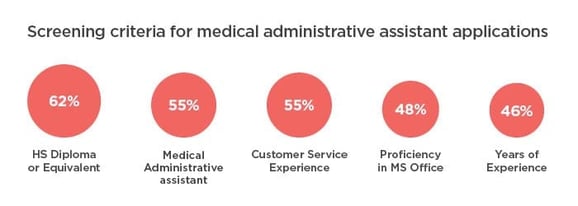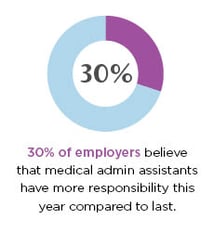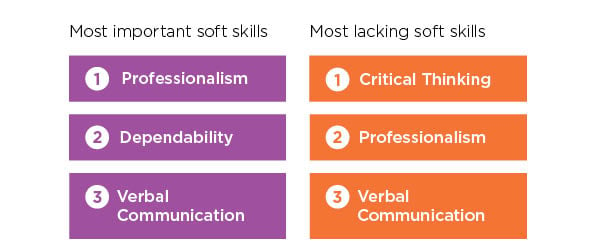One of our priorities at NHA is to provide information and resources to support frontline healthcare workers like medical administrative assistants on their career journey. We recently surveyed 171 healthcare employers to gain insights and trends related to the role of medical administrative assistant to carry us into 2020 and beyond.
Below are a few highlights. For a full summary, download your PDF copy of our 2020 Industry Outlook, now available in this year's edition of accessTM: an allied health industry journal.
When screening applicants, employers value credentials over years of experience.
The top screening criteria include high school diploma or equivalent (62%) and Medical Administrative Assistant Certification (55%). This is promising news for someone who is new to the field!
If you've been through a medical administrative assistant training program, but you've not yet made the decision to take your certification, also consider this: 63% of employers pay employees more when they earn their certification.

 30% of employers believe medical administrative assistants have more responsibility this year compared to last.
30% of employers believe medical administrative assistants have more responsibility this year compared to last.
It's exciting for new and seasoned medical administrative assistants who want to grow their careers as a key member of the care team. Employers now rely on their medical admins to help improve the efficiency and efficacy of the practice, which means they are trusting admins to take on more.
Professionalism, dependability, and verbal communication are the top three most sought-after soft skills for this role.
Medical administrative assistants are often the first people to interact with patients, and essential soft skills are critical for ensuring patients have an excellent experience right from the first phone call through every visit and continued through follow-up communications.
40% of employers say newly-certified medical administrative assistants lack communication skills.
This insight exposes an opportunity for growth for future and current professionals by improving all forms of communication.
If you're not sure if your communication skills are hindering your performance, use this self-assessment to evaluate your interpersonal communication skills and help you create an action plan to improve.

Medical administrative assistants need to be comfortable on the phone and the computer.
Answering calls and operating computer systems are the top two tasks identified for this role. If you've mastered the phone and computer, look at enhancing your skill set by investing some time in learning new technology that helps you communicate with patients via text messaging and email. These programs are on the rise and patients often prefer them. Show employers you're ahead of the curve in understanding what it takes to serve patients now and in the future.
Download an infographic that shares more statistics and trends on the medical administrative profession by clicking the button below.
If you'd like to learn more information about earning your Certified Medical Administrative Assistant (CMAA) credential, visit nhanow.com.


